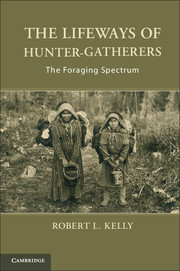Book contents
- Frontmatter
- Contents
- Tables
- Figures
- Preface
- Acknowledgments
- One Hunter-Gatherers and Anthropology
- Two Environment, Evolution, and Anthropological Theory
- Three Foraging and Subsistence
- Four Mobility
- Five Technology
- Six Sharing, Exchange, and Land Tenure
- Seven Group Size and Demography
- Eight Men, Women, and Foraging
- Nine Nonegalitarian Hunter-Gatherers
- Ten Hunter-Gatherers and Prehistory
- Notes
- References
- Index
Six - Sharing, Exchange, and Land Tenure
Published online by Cambridge University Press: 05 April 2013
- Frontmatter
- Contents
- Tables
- Figures
- Preface
- Acknowledgments
- One Hunter-Gatherers and Anthropology
- Two Environment, Evolution, and Anthropological Theory
- Three Foraging and Subsistence
- Four Mobility
- Five Technology
- Six Sharing, Exchange, and Land Tenure
- Seven Group Size and Demography
- Eight Men, Women, and Foraging
- Nine Nonegalitarian Hunter-Gatherers
- Ten Hunter-Gatherers and Prehistory
- Notes
- References
- Index
Summary
My country is the place where I can cut a spear or make a spear-thrower without asking anyone.
Western Desert Aboriginal man (Tindale 1974: 18)You know we are not /xai/xai people. Our true n!ore is East at /dwia and every day at this time of year we all scan the eastern horizon for any sign of cloud or rain. We say, to each other, “Has it hit the n!ore?” “Look, did that miss the n!ore?” And we think of the rich fields of berries spreading as far as the eye can see and the mongongo nuts densely littered on the ground. We think of the meat that will soon be hanging thick from every branch. No, we are not of /xai/xai; /dwia is our earth. We just came here to drink the milk.
Ju/’hoan man (Lee 1976: 94)During fieldwork among the Mistassini Cree, Eleanor Leacock found herself and her informant, Thomas, some distance from camp with very little food. They encountered two acquaintances in the forest who were very hungry and who asked for something to eat. Thomas gave away the last of his flour and lard to them:
This meant returning to the post sooner than he had planned, thereby reducing his possible catch of furs. I probed to see whether there was some slight annoyance or reluctance involved, or at least some expectation of a return at some later date. This was one of the very rare times Thomas lost patience with me, and he said with deep, if suppressed anger, “suppose now, not give them flour, lard – just dead inside.” More revealing than the incident itself were the finality of his tone and the inference of my utter inhumanity in raising questions about his action. (Leacock 1969: 13–14)
- Type
- Chapter
- Information
- The Lifeways of Hunter-GatherersThe Foraging Spectrum, pp. 137 - 165Publisher: Cambridge University PressPrint publication year: 2013



